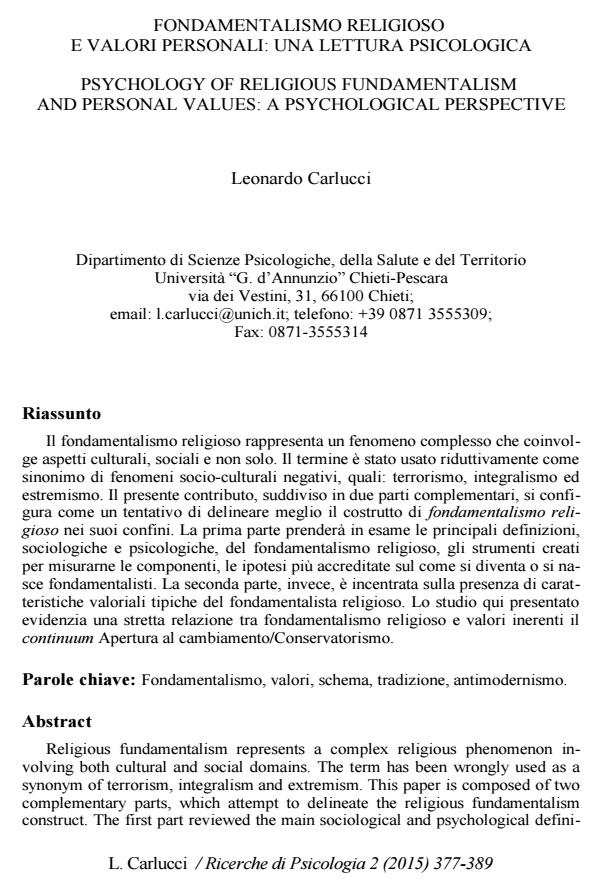Fondamentalismo religioso e valori personali: una lettura psicologica
Titolo Rivista RICERCHE DI PSICOLOGIA
Autori/Curatori Leonardo Carlucci
Anno di pubblicazione 2015 Fascicolo 2015/2
Lingua Italiano Numero pagine 13 P. 377-389 Dimensione file 181 KB
DOI 10.3280/RIP2015-002007
Il DOI è il codice a barre della proprietà intellettuale: per saperne di più
clicca qui
Qui sotto puoi vedere in anteprima la prima pagina di questo articolo.
Se questo articolo ti interessa, lo puoi acquistare (e scaricare in formato pdf) seguendo le facili indicazioni per acquistare il download credit. Acquista Download Credits per scaricare questo Articolo in formato PDF

FrancoAngeli è membro della Publishers International Linking Association, Inc (PILA), associazione indipendente e non profit per facilitare (attraverso i servizi tecnologici implementati da CrossRef.org) l’accesso degli studiosi ai contenuti digitali nelle pubblicazioni professionali e scientifiche.
Il fondamentalismo religioso rappresenta un fenomeno complesso che coinvolge aspetti culturali, sociali e non solo. Il termine e stato usato riduttivamente come sinonimo di fenomeni socio-culturali negativi, quali: terrorismo, integralismo ed estremismo. Il presente contributo, suddiviso in due parti complementari, si configura come un tentativo di delineare meglio il costrutto di fondamentalismo religioso nei suoi confini. La prima parte prendera in esame le principali definizioni, sociologiche e psicologiche, del fondamentalismo religioso, gli strumenti creati per misurarne le componenti, le ipotesi piu accreditate sul come si diventa o si nasce fondamentalisti. La seconda parte, invece, e incentrata sulla presenza di caratteristiche valoriali tipiche del fondamentalista religioso. Lo studio qui presentato evidenzia una stretta relazione tra fondamentalismo religioso e valori inerenti il continuum Apertura al cambiamento/Conservatorismo.
Parole chiave:Fondamentalismo, valori, schema, tradizione, antimodernismo.
- Religious Fundamentalism between Traits and Values Leonardo Carlucci, Armin W. Geertz, Laura Picconi, Michela Balsamo, in The Open Psychology Journal /2021 pp.24
DOI: 10.2174/1874350102114010024 - Does a Fundamentalist Mindset Predict a State or Trait Anxiety? The Covariate Role of Dogmatism Leonardo Carlucci, Bashar Albaghli, Aristide Saggino, Michela Balsamo, in Journal of Religion and Health /2021 pp.1029
DOI: 10.1007/s10943-020-01016-5
Leonardo Carlucci, Fondamentalismo religioso e valori personali: una lettura psicologica in "RICERCHE DI PSICOLOGIA " 2/2015, pp 377-389, DOI: 10.3280/RIP2015-002007